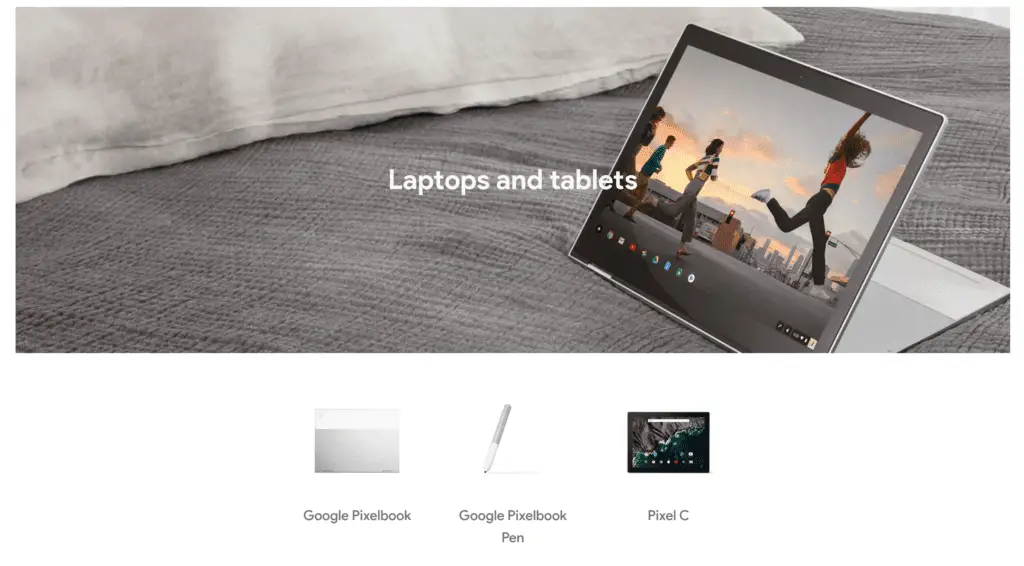![]()
For some, delivery of Google’s new Pixelbook came a few days early. For most, however, tomorrow marks the day that the Chromebook #madebygoogle begins shipping.
But, what if?
Months ago, I speculated that the Chromebook know simply as ‘Eve’ could very well be the next Chromebook Pixel. Today, the Pixelbook has become a reality but with Google’s increasing presence in the consumer advertising space, I’m left wondering if we aren’t in store for more Chromebooks from Mountain View.
Prior to the Pixelbook, Google’s Pixel Chromebooks were mainly torchbearers for Chrome OS meant to set the bar for other manufacturers. While the hardware was the best a Chromebook had to offer, marketing was non-existent.
Fast forward to October 4th, 2017.
Google’s second Pixel event was a whole lot more than just the announcement of two new mobile phones. AI first combining software and hardware. All that wrapped up in an expansive array of #madebygoogle products.
Google Home now offers three different speakers to fit the needs of just about anyone. Pixel Buds offer some unique features tied directly to Google’s Assistant and the Pixelbook has become the poster child for the next generation of Chromebooks.
Pixel 2 and XL 2 along with the Google Clips wireless smart camera rounded off what is now an actual variety of devices actively being marketed under the Google name.
If you head over to the Google Store, you almost get the feeling that Google is a hardware company competing with the likes of Apple or Samsung.
You’ll likely notice something else as well.
Everything not Made by Google or Made for Google is gone. No third-party devices. No Chromebooks apart from the Pixelbook. If it isn’t #madebygoogle or wearing the Made for Google branding, it’s not there.
Take a closer look at what once was the Chromebook page and you will find Laptops & Tablets. You’ll also see there is a lot of empty real estate on this page.

Pixelbook, the companion Pen and the aging Pixel C are all that is to be found. This really has me thinking Google has more up their sleeves. But, what could it be?
This is where speculation takes the front seat and we do a little daydreaming. Chrome OS tablets and detachables are in the works and with a little luck, we’ll get our first glimpses of the new form-factors in the coming months.
Devices like ‘Soraka’ and ‘Scarlet’ are shaping up to be flagship worthy machines and interestingly enough share some characteristics as Chromebook ‘Eve’ a.k.a. the Pixelbook. That is to say, there are some things missing from these Chromebooks that make them suspiciously similar to Google’s recently launched device.
That thing is a manufacturer.
Don’t take that to the back but it strikes me a more than coincidence. Past devices, for the most part, have some company attached to the developers commits while the Chromebook is in the works.
ASUS is pretty transparent. The ASUS Chromebook C302 had @asus.com emails all over it and the Samsung Plus/Pro while a bit less apparent still had Samsung’s name attached to it here and there.
Most other devices are manufactured by ODMs like AMI, Quanta and Bitland. These companies take designs from the OEMs like Dell, Lenovo and Acer then develop and produce the Chromebooks with the OEMs branding. The one rare exception being HP. To date, I have been unable to attach an ODM to the newest Hewlett Packard Chromebooks possibly pointing to in-house manufacturing.
Google’s latest device, the Pixelbook, is linked to only Google and Intel. While there is very likely an actual third-party manufacturing company, Google has branded the Pixlebook and isn’t sharing any information about who had a hand in making it. (and probably won’t although we have a hunch it may be LG)
Both Soraka the detachable and Scarlet the Chrome OS tablet lack the telltale signs of an “other” manufacturer. Being that both devices have been in development for the better part of the year, it lends a lot of weight to the argument that Google may be prepping some new additions to the Pixelbook lineup.
Combine that with the fact that both of these devices are sporting higher-end hardware that can compete with comparable machines in the segment with other OSes like Windows and Android and the new Chromebooks fit the bill for Google’s growing hardware offerings.
Of course, this conjecture is based on a lot of circumstantial evidence and a little bit of my gut talking. I’d be shocked if we don’t see these new devices unveiled at the beginning of the year. Google isn’t known to have a presence at CES but there’s a first time for everything and I have my fingers crossed.

